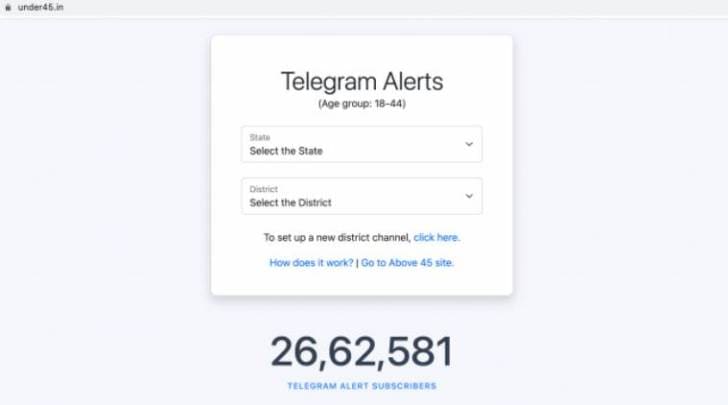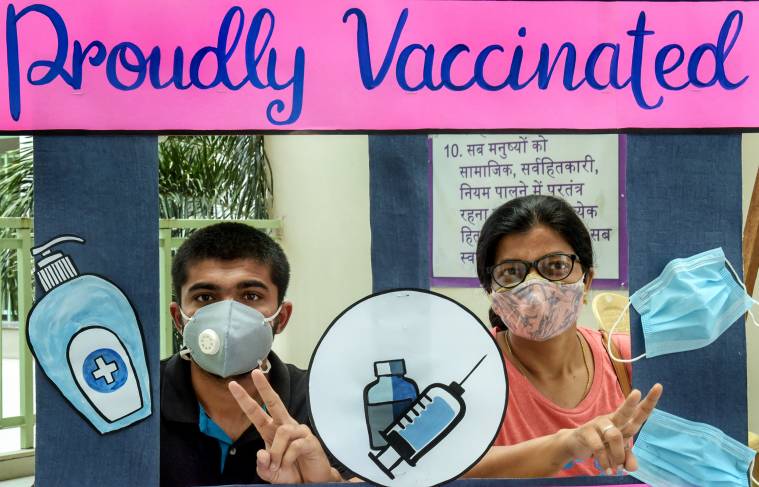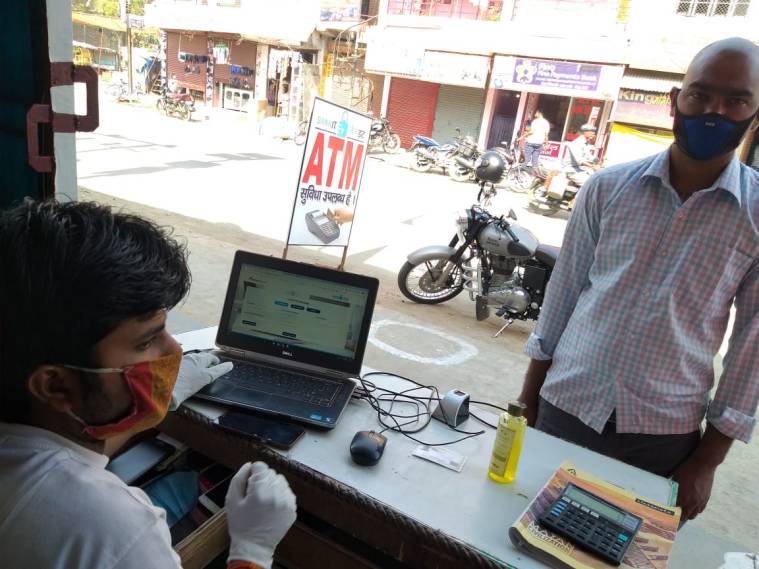“You keep on saying digital India, digital India but the situation is actually different in rural areas. How will an illiterate labourer, from Jharkhand get registered in Rajasthan? Tell us how you will address this digital divide.”
A Supreme Court of India bench of Justices D Y Chandrachud, L N Rao and S Ravindrabhat Monday made their displeasure clear while taking suo moto cognisance of the issues associated with the Centre’s Covid-19 management, including the rollout of vaccination via the Cowin portal.
The Cowin portal, mandatory to register for vaccines, has become a stumbling block for many, especially with vaccine supply being affected across India. It has also prompted activists, volunteer groups and even start-ups to pitch in and help register citizens, many of whom might not be digitally literate.
“Smartphone penetration in India is not great. It is less than 40 per cent, even among age groups which are believed to be more tech-savvy, such as the 18-45,” said Mishi Choudhary, technology lawyer and founder of Software Freedom Law Centre India, adding that “it is very difficult for people to understand a new app,” and the process is “creating a new kind of exclusion.”
“People are fighting for limited resources. We are encouraging only the English speakers, technically literate and the privileged ones who can get access to these shots,” she said. SFLC has also challenged the Cowin portal in the Supreme Court.
Choudhary added that the de facto imposition of Cowin is also a problem. “The tech savvy class from urban centers can book all these slots online.”
Even for this section, it has been an uphill task. When Chennai-based Berty Thomas wanted to get vaccinated early, he realised there was a problem. Though registrations had opened for those under 45 from April 28, finding a slot was impossible. “For large cities they have so many centres, and most of the centres were only showing 45+ age groups. It wasn’t very user-friendly,” he told indianexpress.com.
Thomas, programme manager for a firm in Chennai who likes to code in his past-time, created a small script which used the CoWin API and then found available slots for his first dose in Chennai. Once Thomas shared the script with friends, he quickly realised that a lot of people needed this tool. “So I updated the tool and let people choose the district. I understood it was not just a one city problem, but a pan India one,” he explained.
 The Under45.in website which redirects users to Telegram channels for their district.
The Under45.in website which redirects users to Telegram channels for their district.
The end result was Under45.in, which took Thomas all of three hours to make. The website lets users sign up for Telegram alerts for vaccination slots in their nearby district codes and one which has become very popular.
In fact, after May 1, when vaccinations opened for all adults, the server just crashed from the huge influx of users and he was forced to move to a larger one. “Since people were coming back to the site to check slots, I thought it would be much better if there were alerts, which will be easier for them and easier for me to manage traffic. That’s how the Telegram alerts came in,” he said. So far a total of 23 lakh users have subscribed to these and the website covers more than 600 districts.
While the API rules for Cowin portal were recently changed, Thomas says the data quality has not been impacted. And while Thomas’ workaround has helped many get vaccination slots he too agrees that the Cowin portal has many issues. “Why are you showing 45+ slots for those in the 18+ category? Why show fully booked slots? It is ultimately like a fastest finger first,” he states. The user interface is not exactly user friendly, as he states. He has a point.
One often has to scroll down a whole page on the Cowin website or the Aarogya Setu app to see which slot is still left, which can be a task on a smartphone screen. By the time you have scrolled down, the slot is likely gone.
But while Thomas’ solution has helped many, not everyone has access to Telegram alerts, especially those living in urban slums, where a smartphone is still a luxury.
“The platform is not 100 percent inclusive. As an afterthought, more languages were added, which is a welcome move, but it should have been accomplished proactively while building the platform itself,” Sonal Kapoor Singh, founder director at Protsahan India Foundation told indianexpress.com. Her NGO, which works with child protection in the slums of West Delhi, is now helping out with Cowin registrations in these areas. The reason: they want to ensure that the parents of these vulnerable children are protected against the disease.
Many of the families they work with, are not literate and not everyone has access to a smartphone. And there is a gender divide when it comes to smartphone access. “The girls we have worked with, who have learnt how to read and write are the ones registering someone at home. But they don’t always have access to smartphones, and even if they do it is later at night from their brother or father after they are back from day’s work,” she explained.
 Beneficiaries pose for a photograph after receiving a dose of COVID-19 vaccine, at a vaccination centre, in Gurugram, Monday, May 31, 2021. (PTI Photo)
Beneficiaries pose for a photograph after receiving a dose of COVID-19 vaccine, at a vaccination centre, in Gurugram, Monday, May 31, 2021. (PTI Photo)
The online registration process cannot be seen in a silo either, she added. NGOs also need to fight vaccine hesitancy in many of the slums, which is still a problem.
There are also concerns that the portal is not exactly friendly for those who are visually challenged given the way it has been designed, thus adding to the set of exclusions.b
But it is not only those living in slums who are at risk. Even senior citizens in cities have found the portal hard to navigate. This is the reason why Robinhood Army (RHA), a volunteer-based organisation present in over 200 cities, decided to launch its own chatbot to help out seniors with Cowin registration. “Last year, the problems for seniors were basic rations, food, etc. This time vaccination has been the problem. They are the most vulnerable section in the society and many of them are living alone, if their children are in different cities or even abroad,” Neel Ghosh, founder for RHA told indianexpress.com.
RHA started helping out with vaccinations back in March itself, when the process was first opened for seniors. With the WhatsApp chatbot, Ghosh says the seniors or their relatives can reach out to RHA for help with the vaccination process and other needs as well.
“We help them register on the Cowin portal. We took them to a hospital. We partnered with Uber as well which helps us get rides and take these people to the hospital. With WhatsApp, it is a lot easier for many people to do thanks to the conversational chatbot. Then, they are automatically redirected to the local WhatsApp group of the city,” he explained.
So far, RHA has helped seniors in over 140 cities register and get vaccinated. He also admits that while it was easier in March, the fact that walk-ins are still supported in some hospitals gives them some advantage.
Startups pitching in rural India
In rural areas, the digital divide is even more stark. According to a report by the Indian Cellular and Electronics Association (ICEA), the smartphone base user base in India is at 50 crore or roughly half the population and only 40 per cent of those are in rural areas.
It is this divide that has prompted fin-tech startups working in rural areas to help with Cowin registration. Two such startups BankIt and PayNearBy are both helping onboard their customers in tier 2, tier 3 and other rural areas for vaccination registration.
“We try to deliver banking services at the last mile and are present in more than 10,000 pincodes. Our focus is cities, where people are not always tech savvy and we typically help with banking services,” Amit Nigam, Executive Director and COO at BankIt told indianexpress.com.
 BankIT is a fin-tech startup in tier-2 and tier-3 cities, which is helping its customer base register on Cowin. (Image via BankIT)
BankIT is a fin-tech startup in tier-2 and tier-3 cities, which is helping its customer base register on Cowin. (Image via BankIT)
The startup claims they have three crore-plus customers coming daily to their counters and their agents are now spreading the word on vaccination registrations as well. “We are trying to cover a lot of customers. Word of mouth is very important here. They only need Aadhaar or voter ID or any other form of ID,” he explained. The plan is to target 70 per cent of the customer base and help them register for vaccinations.
PayNearby, another fin-tech startup present in over 17,622 pincodes, claims to have helped register around 8 lakh plus users for vaccinations. The company relies on ‘digital pradhans’ or its own agents, who could be present in kirana shops, ration stores, mobile stores, hardware stores, etc, where rural users also come to carry out their banking services with the help of these pradhans.
“So usually these people come here to buy their rations and because they know our digital pradhan is there, they also do banking services such as withdrawing money from their account. When somebody is asking for monetary services, our pradhans are encouraged to prompt for vaccine registrations,” Anand Kumar Bajaj, CEO of PayNearby told indianexpress.com.
“We’ve just linked the Cowin portal to our app and we then take the customer’s mobile number, OTP, and assist them,” Bajaj said, adding that they plan to help with both doses of the vaccines. The company has over 4.5 lakh retailers who help out its customers with banking and other facilities.
A policy of ‘privileged’ access
While Telegram alerts, startups and NGOs are all pitching in to help with the Cowin registration and vaccinations, the ‘digital’ only policy has been called out by experts, who say this is only creating a sharp divide.
Apar Gupta, lawyer and executive director at Internet Freedom Foundation, concurs with this view. “There’s sufficient data points which adequately explain that there’s a digital divide, with respect to accessibility on any kind of internet for large parts of India’s population. This is in addition to lack of high-speed internet connectivity,” he said. In a column for the Indian Express, he also called it a highly “technocratic approach,” for vaccination, which leaves the marginalised behind.
Gupta points out that there is marked preference for online registrations, that even though walk-ins have been extended for 18 to 44 groups, it is only for utilisation of stock, which might be left behind because people didn’t show up. “Even the alternative reinforces the vaccine inequity,” Gupta said.
The criticism also explains why the government has now said that citizens can call the 1075 Health helpline to get registered. However, here too the direction is to go online and register.





































